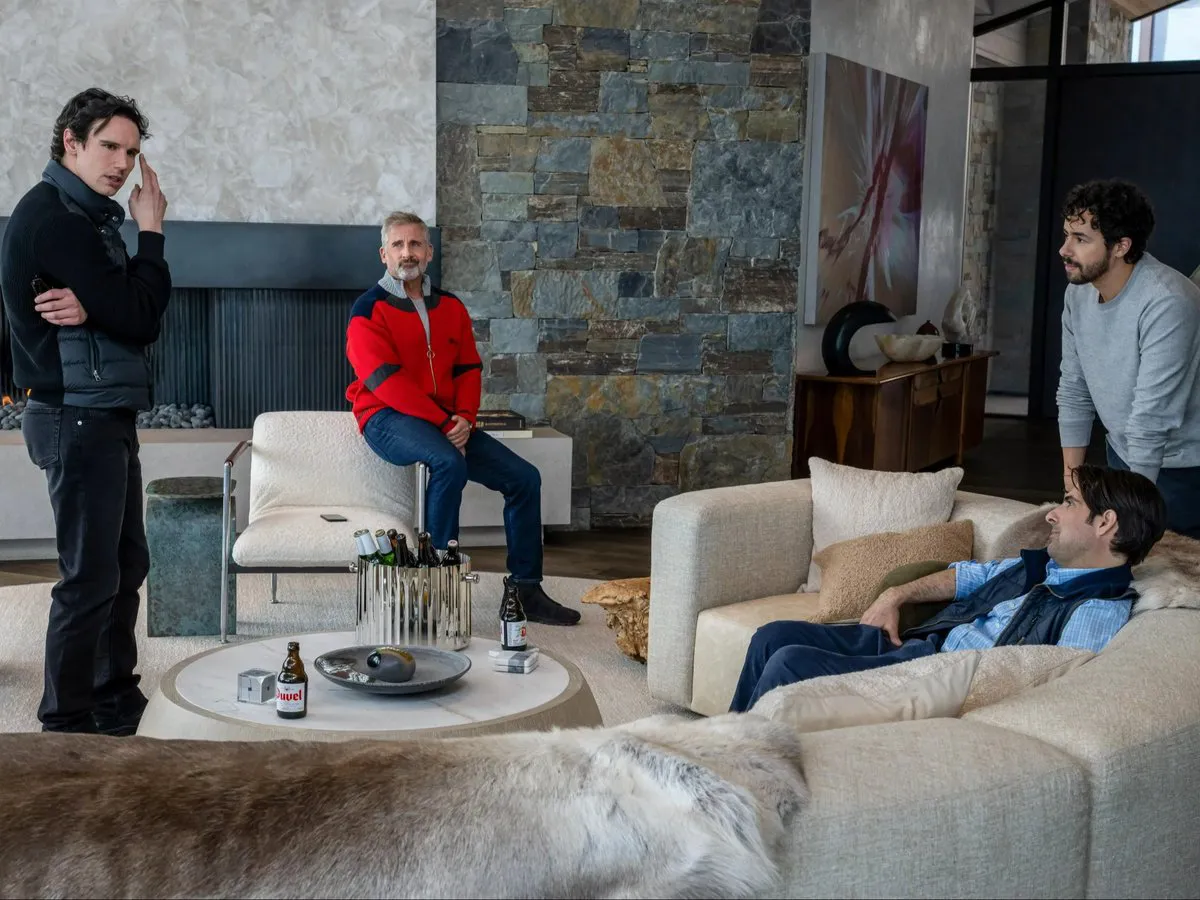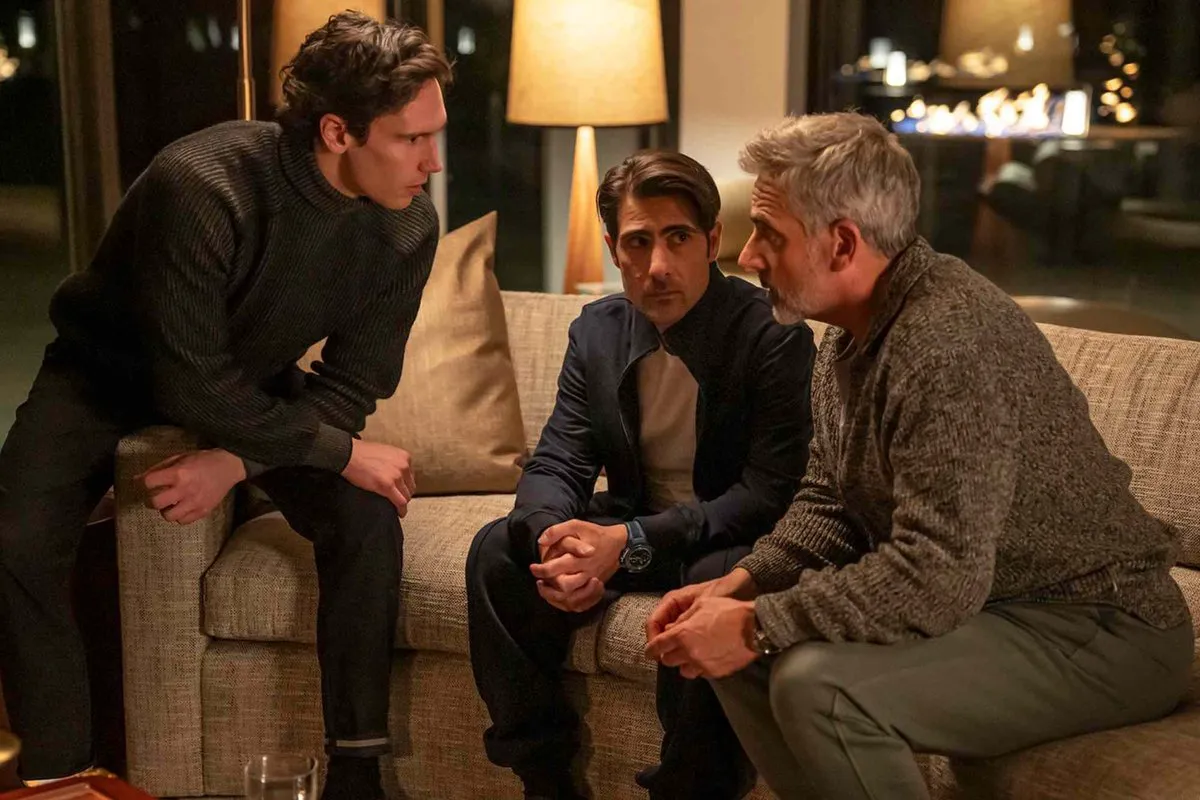Mountainhead: A Weekend of Wealth and Woe
For the first time in ages, four old, wealthy friends escape to a luxurious mountain retreat for a poker weekend. The goal? Relaxation, reminiscing about carefree days, and enjoying each other’s company. A strict rule is enforced: no business deals, catered meals, or female companions. Naturally, someone decides to bend the rules for their own gain.
Venice (Corey Michael Smith), the creator of the world’s most popular social network, Traam, has a problem. The AI within his app is generating such realistic fakes that the world is slowly losing its mind, especially in developing countries. The tech mogul wants to acquire the company of another guest, Jeff (Ramy Youssef), along with his unique neural detector that can distinguish AI-generated content from real photos and videos. The third guest, Randall (Steve Carell), a former mentor to the group, is no longer interested in money or power. Now battling cancer, the guru dreams only of digital immortality. Venice promises to create the technology within five years, making it crucial for him to avoid a scandal and potential bankruptcy due to the AI issue.
Finally, there’s Hugo (Jason Schwartzman), the host and the quartet’s least successful member, who hasn’t yet crossed the billion-dollar mark. He plans to change this with an impromptu pitch, hoping his friends will fund his ambitious new meditation app.

Steve Carell as Randall in “Mountainhead”
From “Succession” to Satire?
Imagine creating one of the greatest TV series in history, cementing your legacy, and collecting every possible industry award. What’s next? Retirement to enjoy your wealth and reputation, like Jerry Seinfeld? Most showrunners return to work with something radically different. David Chase (“The Sopranos”) made a musical dramedy about the 1960s, “Not Fade Away.” Vince Gilligan (“Breaking Bad”) created the comedic police procedural “Battle Creek.” Matthew Weiner (“Mad Men”) produced a drama about the descendants of the Romanov family, “The Romanoffs.” David Simon (“The Wire”) crafted a miniseries about the Iraq War, “Generation Kill.” Two years after the finale of “Succession,” Jesse Armstrong decided to stay close to the themes of obscenely wealthy, power-hungry, and emotionally stunted individuals. Perhaps, to his detriment.

Steve Carell as Randall in “Mountainhead”
Let’s be clear: “Mountainhead” is not “Succession,” and that’s okay. It would be unfair to criticize a 100-minute TV movie for not reaching the same psycho-emotional depths as a 40-hour series. Comparing the characters is equally dubious. In “Succession,” Armstrong aimed to humanize the traumatized and lonely Roy children. In “Mountainhead,” he doesn’t imbue the quartet with any redeeming qualities or attempt to justify their behavior. While the projects share thematic and technical similarities (Nicholas Britell’s music and the semi-documentary shaky camera style), the differences are significant. Armstrong’s primary intention this time is to demystify the elite and expose the true nature of the 1% who control 99% of the world’s wealth. He aims to elevate them onto an improvised Olympus in the form of a tasteless mansion and then, in the eyes of the audience, knock them off.

Steve Carell as Randall in “Mountainhead”
The Banality of Billionaires
Most tech moguls and billionaires are out-of-touch superhumans who contemplate immortality and conquering other planets but behave like immature teenagers with underdeveloped emotional intelligence. It’s an age-old observation! But Armstrong excels at convincingly portraying this dissonance on screen through humiliating rituals and jabs (Hugo, perceived as the poorest, bears the brunt), elaborate insults, or outrageous indifference to ordinary workers.
While the poker weekend unfolds, the world teeters on the brink of collapse. Armed rebellions overthrow governments, and people tear their hair out, unsure if the videos circulating online are real. Meanwhile, the characters jokingly plan to cut off electricity to Belgium for good measure. However, this already seems commonplace. Armstrong’s depiction of the characters’ permissiveness and eccentricity pales in comparison to the more perverse reality. Our billionaires send brides into space and compete with their 18-year-old sons in the number of nocturnal erections.
“Mountainhead” might have worked better as an episode of “Succession,” with Roman and Kendall escaping the city, confronting billionaires, and returning home with a vague sense of clarity. As a standalone film, even in a chamber-drama format, Armstrong lacks dynamism. Watching rich, overgrown children is intriguing, but after the first 30 minutes, you inevitably expect an ironic triumph of justice, some outrageous Ruben Östlund-esque absurdity, or at least a punchline. The final act and the preceding plot twist feel lackluster compared to other entries in the fading “eat the rich” subgenre. There’s no shock, no satire, and no hint of relevance. On the other hand, this uneventfulness and monotony offer a valuable commentary: billionaires only get their comeuppance in movies. More often than not, they emerge unscathed, with a smile on their faces and their fortunes multiplied.